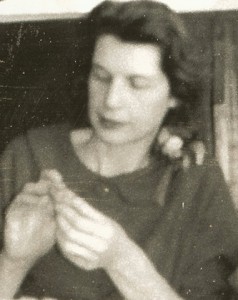Happy Mother's Day, to Foremothers, Poet-Moms, and Maggie
BY Annie Finch
Today I went to visit my mother, Margaret Rockwell Finch, who turned 88 a few weeks ago. As always lately, she showed me a new poem. Maggie was my first model of a

Margaret Rockwell Finch, 1961
working poet, entering and once winning the contests of the Poetry Society of America, whose meetings she brought me to as a teenager; typing drafts and final copies (with carbon copies!) on her portable typewriter; keeping green metal fileboxes recording submissions to magazines and contests.
Lately I realize how much of my own poetic destiny has been shaped by my relationship with her. I grew up on stories that ended up making a larger story whose outlines I can only now perceive. It was her mother, and her aunt, who believed in her as a poet from the beginning. When she enrolled in a class with John Malcolm Brinnin in the 1940s, she was told that her poetry was “too lacey and Millayish,” but she kept on her path undaunted, proud to be associated with Millay. She met my father at a lecture by Auden, suspects him of possibly “disappearing” her Millay collection after an argument early in their marriage, and stopped showing him her poems after he told her he thought she should write like T.S. Eliot.
Maggie has always been stubborn about her poetry—and a good thing, too. Just this afternoon I suggested she add a "the" to the first line of her new poem beginning "Standing at window." "Hmmmm ..." she replied, and then told me that one of my sisters had suggested the same thing by email earlier in the day. Her tone made it clear she was unlikely to change it.
My mother has been writing since the 1920s, when she was too young to write and her mother had to write her poems down for her. But I published her first book for her, in the mid 1990s. Why hadn’t she taken her poetry further in terms of a career, I asked her years ago. She answered that as the mother of five children, she just hadn’t been able to maintain enough silence.
Maxine Kumin told me once, not too many years ago, that her mentoring energy now is reserved not for younger poets, but for women poets not much younger than herself. I understand this.
It’s mother’s day, and I’d like to pause to honor all the poetic foremothers whom we celebrate on the Wom-Po listserv—all the women through the centuries who managed to write, and sometimes to publish, in spite of everything. And I’d like to honor all the poet-moms, to name another listserv—the contemporary poets who are also mothers and still struggling with many of the same issues of divided loyalties, divided poetic identity, and divided attention that made being a poet so tricky for my mother. And most of all, I’d like to say Happy Mother’s Day to my first poetic influence, Margaret Rockwell Finch.
Margaret Rockwell Finch
THE SEVENTEENTH DAY OF MAY
Grow maples in me this grow-maple day;
I lie in the long chair and wait your coming.
Spin from branches heavy with fruit of leaves
My sudden seeds, my one-wings, turning, turning!
Leap in the wind that understands the life:
Land on on my leg and do not slide;
Catch in the ready furrows of my hair—I say
I have no pride.
For in me all the broad and murmuring branches
Wait but to hear it spoken.
The porch, the chair, the gutter will not take you.
But I am open.
Heads of life, stretched to the shape of flight,
Plunge to my upturned palm, and with good reason:
My earth, my rain, my sun, my shade will grow you.
Let your season bring me into season.
Annie Finch is a poet, translator, cultural critic, and performance artist. She is the author of seven...
Read Full Biography

